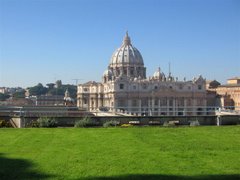This is a Paul Revere moment for America. But it's not the British who are coming; it's Big Brother.
 Do you assume America is a free country? Do you assume religious freedom is guaranteed in America? Most of us learned that in school and have taken it for granted ever since. In other countries people might have to worry about whether and how they can practice their religion. Not here. This is America, after all.
Do you assume America is a free country? Do you assume religious freedom is guaranteed in America? Most of us learned that in school and have taken it for granted ever since. In other countries people might have to worry about whether and how they can practice their religion. Not here. This is America, after all.
Why do we think this way? It partly has to do with our law.
The founders and framers of our system of government met in Philadelphia in 1787 to draft the Constitution, to delineate and circumscribe the powers of government. They then submitted the Constitution to “we the people” to ratify. But many people all over the country worried that the document they came up with didn’t do enough to protect our rights and liberties. And so one of the first things the First Congress did was to propose a Bill of Rights, which became the first ten amendments to the US Constitution.
Not by accident did the First Amendment begin with religious freedom, protecting it from infringement in two ways: (1) by prohibiting an official, governmentally-sponsored religion (“Congress shall make no law respecting an establishment of religion’) and (2) by protecting the people in their free exercise of religion (“or prohibiting the free exercise thereof.”).
What does this mean? It doesn’t mean that in this country you have just the right to believe whatever you want to believe. Even in North Korea they have that right, because as a practical matter no one can force you to believe or not believe something. The free exercise of religion means the ability to act on those beliefs. To practice your religion in private or in public. To proclaim your religion to others, if you wish. To spend your money in furtherance of your own religion, and not in furtherance of anyone else’s. To promote what you think is moral, and to not promote anything you think is immoral. These are all necessary consequences of the idea of religious freedom.
But law without practice is a dead letter. Our faith in our American freedoms also has something to do with our history.
The first English-speaking Catholics to come to these shores, led by Cecil Calvert, Lord Baltimore, in 1634, practiced religious toleration, remarkable for its day. The idea then in vogue was to create a community where everyone was on the same page in everything. Catholic countries were supposed to be Catholic. Protestant countries (and colonies) were supposed to be Protestant. Well, Lord Baltimore bucked the trend. And in 1649 the Maryland General Assembly enacted an Act of Religious Toleration, which promised to every self-described Christian that he or she should not “be troubled, molested or discountenanced for or in respect of his or her religion nor in the free exercise thereof… nor any way compelled to the belief or exercise of any other religion against his or her consent.”
To his credit, Roger Williams, the founder of Rhode Island, who arrived to Puritan Boston in 1631, would go even further. Driven from the Massachusetts Bay Colony for his religious dissent, his colony would allow freedom to practice religion to everyone: Protestants, including Quakers, Catholics, Jews, and Muslims. In 1658, the Rhode Island General Assembly reminded the other colonies in New England that “freedom of different consciences, to be protected from enforcements, was the principal ground of our Charter… which freedom we still prize as the greatest happiness that men can possess in this world.”
Abraham Lincoln had occasion to join his voice to the cause of religious freedom in the 1840s, a time when Nativism was exhibiting its persistent anti-Catholic strain: “The guarantee of the rights of conscience, as found in our Constitution, is most sacred and inviolable, and one that belongs no less to the Catholic, than to the Protestant, and… all attempts to abridge or interfere with these rights, either of Catholic or Protestant, directly or indirectly, have our decided disapprobation, and shall ever have our most effective opposition.”
A hundred and twenty-five years ago, in 1887, James Cardinal Gibbons, Archbishop of Baltimore, went to Rome to take possession of his titular church, Santa Maria in Trastevere, the oldest church in Rome dedicated to Blessed Virgin. He gave a famous sermon there celebrating the American tradition of separation of Church and state. He said, “For myself, as a citizen of the United States, without closing my eyes to our defects as a nation, I proclaim, with a deep sense of pride and gratitude, and in this great capitol of Christendom, that I belong to a country where the civil government holds over us the aegis of its protection without interfering in the legitimate exercise of our sublime mission as ministers of the Gospel of Jesus Christ.”
That Church in Rome where Cardinal Gibbons spoke contains the mortal remains of Cardinal Campeggio, a Renaissance prelate who had been sent to England to judge, along with Cardinal Wolsey, the annulment proceeding of Henry VIII against his wife Catherine of Aragon. This reminds us, of course, of the martyrs John Fisher and Thomas More who both gave their lives to protect the freedom of the Church when the King put himself in place of pope and bishops at the head of the Church in England, something which clearly violated the first article of Magna Carta, “that the English church shall be free, and shall have its rights undiminished and its liberties unimpaired.”
There are lots of moral lessons to be drawn from the story of Henry VIII. But since I’m a lawyer I want to emphasize legal technicalities, and particularly this bit about the Magna Carta. The Magna Carta guaranteed the rights of the Catholic Church in England. But the chief executive officer of the country tossed it away because he had the will to do so. He had the power to do so largely because not enough people stood up to him. We remember our sainted martyr John Fisher. He was made a Cardinal by the pope, but his “head was off before the hat was on.” There were 13 other bishops in England at the time. Do you remember any of their names? Probably not, because when the winds blew their house caved in. We remember Thomas More. But there were many more lawyers and government officials at the time. They heard what the lion wanted, and they gave it to him.
This fall we will commemorate the 50th anniversary of the opening of Vatican II, pretty clearly the greatest religious event of the last century. In some ways the American contribution to the Council is principally to be found in its Declaration on Religious Freedom, the handiwork of the American Jesuit John Courtney Murray, which solemnly affirmed: “that the human person has a right to religious freedom. This freedom means that all men are to be immune from coercion on the part of individuals or of social groups and of any human power, in such wise that no one is to be forced to act in a manner contrary to his own beliefs, nor is anyone to be restrained from acting in accordance with his own beliefs, whether privately or publicly, whether alone or in association with others, within due limits.”
Now we are implicated in this battle over the HHS mandate concerning contraceptives, abortion-inducing drugs, and sterilization. It could have been another flashpoint. Denmark, for example, has just required churches to solemnize same-sex weddings. In Ireland, the government is seriously proposing abolishing the centuries-old priest-penitent privilege, thus enabling the government to force priests to violate the sacred seal of confession, something that has been well-settled in the common law since the days of Henry II and St Thomas Becket. In Nigeria, in what seems like a weekly ritual, Christians are being killed for attending church.
How fortunate we are that we are not encountering any of these obstacles to living in accord with our consciences. Still, the threat to our religious freedom is real. When our government tells us we must pay for acts we believe and know to be immoral for everybody, our situation is comparable to what’s happening in these other places, even if isn’t precisely similar. So what are we called upon to do?
Of course, we want to render to Caesar the things that are Caesar’s. But we must also render to God the things that are God’s. Conscience, as the voice of God within, is distinctly a resident of Our Father’s house. When the government tries to force conscience to bow to Caesar, we have no choice but to obey God rather than man. When the authorities in Jerusalem ordered Sts. Peter and John to stop preaching about Jesus, they replied, “Whether it is right in the sight of God for us to obey you rather than God, you be the judges. It is impossible for us not to speak about what we have seen and heard.”
Note the context and the details. Peter and John didn’t say the authorities were illegitimate. They didn’t tell the authorities what they must believe. They even invite their listeners to judge for themselves according to their own consciences. But they stand their ground on one point: that they must do the will of God, no matter what anyone else—government included—says.
It’s a bit of a Paul Revere moment. Only this time it’s not the British that are coming. It’s Big Brother. Or, if you prefer, think of Rosa Parks. We can go along and sit quietly in the back of the bus, or we can stand up for human dignity and the rights of conscience. When it comes to our precious heritage of religious freedom, we must either use it or lose it.
By: Dwight Duncan is professor of law at University of Massachusetts School of Law Dartmouth.




No comments:
Post a Comment